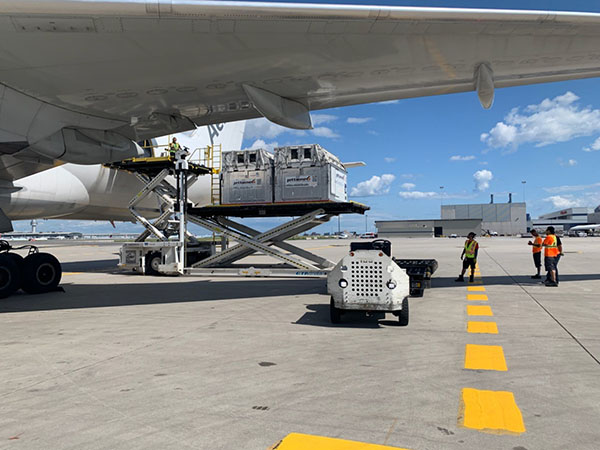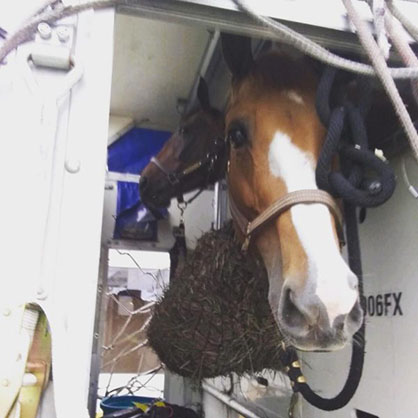Equine Air Transportation During COVID-19: What You Need To Know

PMG release
Wellington, Fla. – With the winter competition season coming to an early halt in many parts of the world, an already busy travel season for horses is beginning with a number of new unanswered questions for many equestrians. Unfortunately, shipping arrangements for many equines may need to be altered given the widespread postponements and cancellations of competitions. As seasonal exhibitors across the country will ship competitive horses home or elsewhere and sales prospects will be traveling to new owners, how should horse owners react to COVID-19, also known as “coronavirus,” as it affects the world? Wherever in the world your horse needs to go, do you know how to prepare and what to expect?
To get answers to some of the equestrian industry’s most frequently asked questions about equine air travel and the spread of COVID-19, Phelps Sports consulted Molly Smith, the resident Import/Export and Logistics Specialist at EquiJet, one of the leaders in international equine transportation.
A Canadian citizen, Smith has served as an integral part of EquiJet’s operations thanks to her firsthand knowledge of transporting horses across borders, both state and national, and brings a deep understanding and transparency to the travel process to ensure client confidence. As an equestrian herself and tenured employee of EquiJet, Smith knows all the ins and outs of horse transportation, and has answered some of the community’s “need to know” questions about equine air travel:
1. First things first, the question everybody wants to know: How should horse owners respond to COVID-19, and are the shipping companies proceeding?
“Although this is a scary time, staying calm and organized is key. EquiJet and other shipping companies are capable of editing travel plans and making new ones for horse owners once they determine what their new schedule may be if it had to change due to travel restrictions or health concerns. Most operations will resume normally, with understanding that essential travel may be given priority over non-essential travel.”
“To prevent the spread of COVID-19 via domestic or international air freight, which includes horses and equipment, we are working closely with the United States Department of Agriculture (USDA) and the respective customs offices to ensure that all animals and items in transport are handled with the utmost cleanliness and precaution to limit any risk of transmission.”
“Although this doesn’t directly relate to equine air travel, we also recommend that any equestrians who are outside of their home nation contact their appropriate government body to register their status if they are outside the country. That way they will have less trouble getting home if their home country enacts travel restrictions or quarantines.”
2. Can horses contract the virus?
“Horse owners can rest assured that, at this time, there is no evidence to indicate that horses could contract COVID-19 or that horses would be able to spread the disease to other animals or humans, according to the Center for Disease Control and Prevention (CDC) as well as multiple animal health organizations from around the world. Though equine enteric coronavirus, which is a gastrointestinal disease, bears a similar name to the current human coronavirus, they are not the same strain, and it is not believed that either are transmissible between species.”
 3. If a border to a country is closed, can horses still travel in and out?
3. If a border to a country is closed, can horses still travel in and out?
“At this point, we are not aware of any restrictions specific to travel for horses. The problem becomes the people that travel with the horses. We can’t send the animals alone, but if a country is not accepting non-citizens then we may not be able to send the pilots or grooms to the horses’ destinations because they won’t be legally allowed into the country. For that reason, some equestrians have had a hard time moving their horses internationally because they, as the owners or riders, may not be allowed into a certain nation, forcing them to seek alternative arrangements.”
4. What if a state is quarantined? Could horses be trailered in and out?
“Just like the previous question, this is tricky. At this point, there are no real restrictions that we are aware of, but it really depends on the regulations put in place by the horse’s final destination. If a state has closed its borders, we will need to go through extra steps to get the trip approved by a local entity. We have to take things on a case-by-case basis to ensure that a horse can cross into a state and can get off the trailer once it has arrived without any health concerns.”
5. Are grooms screened prior to boarding a flight?
“Yes, any people that will be on the plane, including grooms, are screened for symptoms that would deem them incapable or not allowed to travel, which includes taking temperatures.”
6. Is equipment sanitized before it goes to its final destination?
“Equipment that is shipped with horses is already disinfected as it reaches its destination in normal times, so those precautions have been ramped up during this pandemic. All equipment is cleaned and disinfected after travel, including the aircraft, to ensure that there is no transmission of the virus or other bacteria. Cleaning measures have always been important when shipping horses internationally in order to not spread disease, which is also why horses are quarantined following international travel, so this is not anything new to many shippers, airport employees and the United States Department of Agriculture (USDA) employees that handle the horses. Since this has been an ongoing practice, we were able to quickly implement further measures to prevent equine air transportation from contributing to the spread of the coronavirus.”
 7. Are there currently any places that horses can’t go, or that you would recommend owners not to send their horses?
7. Are there currently any places that horses can’t go, or that you would recommend owners not to send their horses?
“EquiJet currently has services to and from Europe and North America. The rest of the world is dependent on the current immigration requirements, which can change at any time based on local, regional and national governments. Things are changing day by day, so horse owners should consult with equine transportation companies that are accustomed to shipping horses internationally in order to check if their desired destinations are possible to reach.”
Stay tuned for the next installment of “Equine Air Transportation: What You Need To Know,” where Smith answers common questions about standard equine travel practices.
When transporting your horses, be sure to contact an experienced shipping company to ensure your horse’s health, safety and happiness. More than just the flight itself, shippers should be equipped to handle quarantine logistics and necessary paperwork, allowing owners and trainers to send their horses with peace of mind. To learn more about Smith or EquiJet, please visit EquiJet.com.
ABOUT THE EXPERT
After finishing her BBA at the University of New Brunswick, Smith spent winters riding in Florida, which led to meeting the owners and founders of EquiJet, Bastian Schroeder and Margot Peroni, and ultimately a position with EquiJet beginning in the spring of 2018. Her extensive background in business operations and the equine industry, as well as knowledge of the international borders and connections, gave her a strong foundation for developing a successful career with EquiJet.










